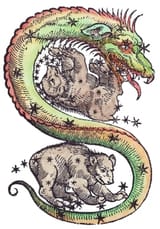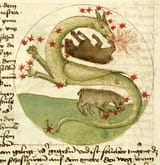Anonymous
6/28/2025, 4:14:50 AM No.17797215
>Geoffrey of Monmouth expands upon this story in his Historia Regum Britanniae, in which it forms the earliest foundation of Britain and the beginning of its recorded history. In Geoffrey’s meticulously constructed pseudo-history, Brutus wages war against the Greeks to free a group of enslaved Trojan descendants, survives an encounter with the Sirens, and is led to Britain by a vision he receives from the goddess Diana. In doing so, Brutus emulates—or even surpasses—the heroes of Classical mythology. Brutus was the legendary founder and first king of the Britons, reigning around the twelth century BCE, sometime after the Trojan War. He is considered to be an ancestor to Arthur and reigned alongside the first duke of Cornwall, Corineus
>The name "Artemis" (n., f.) is of unknown or uncertain etymology, although various sources have been proposed. R.S.P. Beekes suggested that the e/i interchange points to a Pre-Greek origin. Artemis was venerated in Lydia as Artimus. Georgios Babiniotis, while accepting that the etymology is unknown, also states that the name is already attested in Mycenean Greek and is possibly of pre-Greek origin
>The name may be related to Greek árktos "bear" (from PIE *h2ŕ̥tḱos), supported by the bear cult the goddess had in Attica (Brauronia) and the Neolithic remains at the Arkoudiotissa Cave, as well as the story of Callisto, which was originally about Artemis (Arcadian epithet kallisto); this cult was a survival of very old totemic and shamanistic rituals and formed part of a larger bear cult found further afield in other Indo-European cultures (e.g., Gaulish Artio). It is believed that a precursor of Artemis was worshipped in Minoan Crete as the goddess of mountains and hunting, Britomartis
>The name "Artemis" (n., f.) is of unknown or uncertain etymology, although various sources have been proposed. R.S.P. Beekes suggested that the e/i interchange points to a Pre-Greek origin. Artemis was venerated in Lydia as Artimus. Georgios Babiniotis, while accepting that the etymology is unknown, also states that the name is already attested in Mycenean Greek and is possibly of pre-Greek origin
>The name may be related to Greek árktos "bear" (from PIE *h2ŕ̥tḱos), supported by the bear cult the goddess had in Attica (Brauronia) and the Neolithic remains at the Arkoudiotissa Cave, as well as the story of Callisto, which was originally about Artemis (Arcadian epithet kallisto); this cult was a survival of very old totemic and shamanistic rituals and formed part of a larger bear cult found further afield in other Indo-European cultures (e.g., Gaulish Artio). It is believed that a precursor of Artemis was worshipped in Minoan Crete as the goddess of mountains and hunting, Britomartis
Replies:



